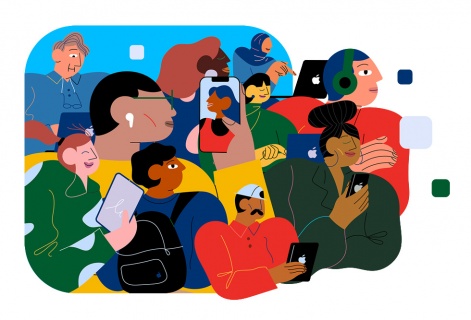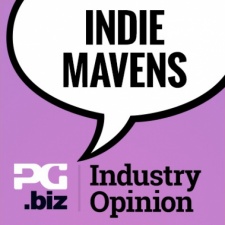The games industry is a constantly shifting, ever-growing place that is filled with talented creatives at all parts of the company hierarchy.
Today, however, the triple-A market often struggles with taking risks and often relies too much on already established IP and done to death ideas. That's why many argue that the best creativity stems from the indie market.
The notion of indie development was once a pipedream (and still is for lots), yet the rise of the indies is one of the biggest markets of growth over the previous decade. A good game released at the right time can now skyrocket a studio to untold heights like never before.
Of course, there are dozens of daily trials and tribulations that come with this territory, all leading to a ginormous wealth of knowledge and expertise to pull from - hence why after a brief hiatus and refresh, PocketGamer.biz is back with its Indie Mavens series.
Whether it's discussing the hottest topic of the month, the ongoing difficulties of game development, or the conundrum surrounding visibility, our Indie Mavens will be revealing all.
This time, the topic of discussion focused on Apple's announcement to introduce a new App Store Small Business Program, which from January 1st, 2021 will reduce the 30 per cent standard fee to 15 per cent for any developer that earns less than $1 million in annual sales from all of their apps, concerning all paid app revenue and in-app purchases. So to sum up:
How big of an impact do you think the App Store Small Business Program will have on indie developers?
Is this a good move overall from Apple and are there any negatives to this decision for developers that sign up to the program?
I feel this is a great move by Apple and will no doubt benefit small businesses. Having 15 per cent fewer fees just means more money and revenue for the developer, and this revenue can be put to their next games. This is especially significant for smaller developers where money is a constant problem.
It should also be of note that typically the industry standard for platform cuts in video games is 30 per cent, so cutting this down by half for the vast majority of developers on the platform is really great, and hopefully, we see this start to happen across the industry as well. Personally, I am also curious if Google would follow suit since now, on some level, it would be more lucrative to sell a game on iOS rather than the Play Store.
I think this one's pretty clear cut for single person indies like myself. The reduced fee is a definite plus! That said, without seeing the fine print, it's hard to say whether or not there's a downside. However, I think it will be interesting to see how other storefronts react to this and I would hope that they're feeling some sort of pressure to at least match the cut.
As a couple of people in the industry have pointed out though, one million dollars doesn't go a long way for developer houses that employ more than a couple of people, so I'm also interested to hear from those perspectives.
This is a great initiative that’s really going to help new and upcoming indie developers on the App Store. Keeping an extra 15 per cent (especially when you’re a new and upcoming developer) really adds up. I’m glad to see Apple doing this and it certainly would have been very helpful for Snowman in our earlier years.
I can’t see any downsides to this at all. I think this is a great initiative from Apple and exactly the kind of thing we need at a time like this.
This could be a big deal for a small team. For a group doing $500,000 in revenue on the App Store, this is $75,000 back into their pockets to hire another person or build up reserves to start new projects.
Even though I’m all for these fees being lower across all platforms, I didn’t particularly care for the way Epic attempted to make Apple look like a villain, with Epic fighting for the little guy. Epic is not an indie studio, it is a huge corporation. This is a great move by Apple, doing something meaningful for smaller companies while simultaneously undercutting Epic’s narrative.

I understand it costs a fortune to run the App Store. With this new policy, paying for it will disproportionally fall on large corporations making tons of money. I’m sure the likes of Spotify and AirBNBs of the world won’t like that, but for everyone else, it’ll be great. I’m all for the 'Robin Hood' mentality.

I think it’s a decent move on the behalf of Apple. Ironically, Tim Sweeney achieved one of his goals which he set out to do when the lawsuit ensued, stating that in an interview that he wanted to "make a better future for developers". Fighting for better percentages via the lawsuit was a step in that direction for those developers.
The only negative I see for developers is that by signing up and crossing over the one million dollar mark in sales means you get kicked out of the program for the calendar year. Then, if a developer makes less money they have to re-apply.
How fast do they get kicked out? Is it yearly? Quarterly? How fast is the approval to reapply? Sales vary rapidly in games - sometimes weekly - and if the whole program is not a smooth process from start to finish this could become a quick mess. There needs to be more criteria stipulations in place that can attempt to adjust to the current market in order for more trust to be had in Apple.
Admittedly, I never expected this to happen. In my opinion, we are extremely lucky to be the beneficiaries of the huge behemoths fighting it out, commingled with a parallel antitrust lawsuit with the US Department of Justice, and Apple playing this fig leaf move as a brilliant PR wedge against the attacks. It just so happens this move lands a big cheque right in our laps.
It really will help to spur and encourage more indie developers to give greater priority to the Apple platform.Simon Joslin
As a result, we get an insane deal where Apple brings the customers, features our work, takes the payments (and all that entails!), manages taxes in each state and country, does refunds, and hosts the content all for just 15 per cent. Wow! If you were to go it alone and sell your game on your own storefront on the web (obviously just a hypothetical world on iPhone), the amount of work to get yourself selling in 175 countries would be insane and cost well beyond $150,000 to run each year.
I'm very pleased but I'm also well aware we're just lucky pawns in all this. Apple isn't just picking this solution at random to solve their lawsuit problem though. It really will help to spur and encourage more indie developers to give greater priority to the Apple platform. That'll be great for their ecosystem at large.
So many huge corporations today started out as tiny indies on iPhone - think Instagram. This program really does give a leg up to small businesses who live or die on less than one million dollars in revenue per year, and the more they do that on iPhone/Mac/iPad etcetera. the better it is for Apple. Two birds, one stone!

Jennifer Schneidereit is the co-founder and game creator of British-based indie studio Nyamyam.
It is great Apple are sticking up for smaller developers by changing their cut from 30 per cent to 15 per cent. I am sure this is going to make a hugely positive impact - especially for developers living from game to game. I hope this will also nudge Steam into the right direction to reduce their cut. Let’s be frank: neither Apple nor Valve provide enough of a service to deserve a 30 per cent cut.
As for the downsides, it seems that smaller publishers are somewhat disadvantaged by the change. Reaching the one million threshold is not that difficult if you are launching multiple titles in a given year, and developers are potentially losing out on money if they don’t self publish. This puts a lot of pressure onto these smaller publishers to prove that they are instrumental in making more than one million in revenue.
I am wondering if this new system will incentivise developers and publishers alike to create a separate business account per game to take advantage of the cut, or if we will see publishing partnerships in which the game is listed on the App Store under the developer’s account instead. I would have preferred for the cut to be on a per app rather than per account basis to avoid the downsides mentioned above for smaller publishers.

Theresa Duringer is the CEO of mobile board game developer Temple Gate Games. Previously, Duringer co-founded Turtle Sandbox Games.
Indie developers are the lucky pawns in a much bigger battle between the Apple, Epic and government market regulators. As the CEO of Temple Gates Games, I'm thrilled about the prospect of paying half the normal fee to the App Store. But you have to ask, why were we paying 30 per cent in the first place?
Indie developers are the lucky pawns in a much bigger battle between the Apple, Epic and government market regulators.Theresa Duringer
In other digital industries, single-digit percentages are the norm for a store fee, but without meaningful competition, there hasn't been a big incentive for Apple to reduce its cut. Most individual developers can't afford to pushback. Pushback could mean selling content outside of Apple's payment system. We just aren't big enough to eat the cost of violating the Apple Developer Agreement, get booted from the App Store and lose access to our largest customer base.
We've seen rogue companies like Basecamp act by allowing users to create and pay for online accounts with their own payment system. Apple rejected Basecamp's update on the store, but Basecamp's public pushback has been part of a growing chorus that has drawn regulators' attention as high as the US Supreme Court.
The court is the right place to solve this problem. This is a monopoly issue. Without competition, there will be no incentive for Apple to budge. And while indie developers typically can't afford a janitor (let alone a legal team), there are bigger companies out there that can.
Overall this is great. It's a step in the direction of a healthier app store ecosystem. It's an affirmation that institutions meant to check runaway monopolies hold weight. For small development studios like ours, it means we can hire new talent or invest in tools.
I obviously welcome the change in percentage but I am not convinced it will have much impact on most indie developers. The main benefit indie devs gained from the App Store is the downloads from being featured.
In recent year, that has been massively diminished through various changes to the storefront. So, personally, if Apple wanted to help indies I’d much rather take the featuring power we had a few years ago and Apple keeps their 30 per cent cut.
If you are interested in joining our Indie Mavens list, please contact matthew.forde@steelemedianetwork.com for further details.



























